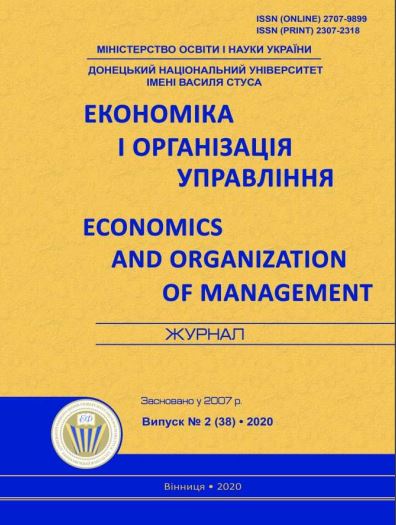Аналіз і перспективи інноваційної діяльності в Польщі і в Україні
DOI:
https://doi.org/10.31558/2307-2318.2020.2.4Ключові слова:
інновація; інноваційний розвиток; інноваційна політика; інноваційна діяльністьАнотація
Головним завданням даної публікації полягає в тому, щоб провести порівняльний аналіз розвитку інноваційної діяльності в Польщі та в Україні за останні роки, з огляду на багато факторів, які впливають на даний процес. Однією з головних цілей, також, є визначення основних чинників, як позитивних, так і негативних, які впливають на поліпшення інноваційного розвитку двох країн. Виявлено основні залежності не тільки від наявності власних ресурсів і показників розвитку економічної діяльності країни, але і від відносин з іншими країнами, політичним впливом і міжнародними організаціями, такими як наприклад Європейський Союз. У статті робиться акцент на тому, що, інновація визначається як економічно успішна експлуатація нових ідей. У статті інновації розглядаються як послідовність технічних і організаційних змін, включаючи, з одного боку, прості модифікації існуючих продуктів, процесів і практик, а з іншого - те, що є новим як для галузі, так і для компанії. Впровадження інноваційних технологій включає в себе цілий спектр наукових, технологічних, організаційних, фінансових і комерційних заходів. Розглядаючи тенденції інноваційного розвитку двох країн видно явні відмінності у фінансуванні і підтримці з боку держави. У розвитку сучасної держави інноваційна політика відіграє дуже важливу роль. Саме масштаб і характер економічної реконструкції держави багато в чому залежать від того, як реалізується інноваційна політика.
Посилання
Шумпетер Й. Теория экономического развития / пер. с англ. В.С. Автономова. – М.: Директмедиа Паблишинг, 2008.
M. Szymczak, Słownik Języka Polskiego, PWN, Warszawa 1996, s. 743.
C. Freeman, The National System of Innovation in historical perspective, Cambridge Journal of Economics, vol.19, Cambridge 1995, s.5.
M. Porter, The Competitive Advantage of Nations, The Free Press, New York 1990, s. 671- 679.
E Stawasz, Innowacje a mała firma, Wydawnictwo Uniwersytetu Łódzkiego, Łódź 1999.
K. Kozioł, Ewolucja polityki innowacyjnej w Unii Europejskiej, [w:] Innowacje w strategii rozwoju organizacji w Unii Europejskiej, Wydawnictwo Difin, Warszawa 2009.
OECD Innovation Strategy 2015, An Agenda for Policy Action, Paris 2015.
Uchwała Nr 105 Rady Ministrów z dnia 28 grudnia 2000 r, Monitor Polski nr 43, poz.851.
J. Bober, J. Górniak, S. Mazur, Programowanie strategiczne i jego realizacja jako narzędzia polityki rozwoju, Ministerstwo Rozwoju Regionalnego, Warszawa 2008 r.
Narodowe strategiczne Ramy Odniesienia na lata 2007-2013 wspierające wzrost gospodarczy i zatrudnienie, Ministerstwo Rozwoju Regionalnego, Warszawa 2006.
https://pl.wikipedia.org/strategia na rzecz Odpowiedzialnego Rozwoju (wejście na strone7.09.2019 r.)
D. Rostowski, Przez 15 lat w UE Polska notuje nieprzerwany wzrost gospodarczy, https://www.obserwatorfinansowy.pl/tematyka/makroekonomia, wejście na stronę 6 października 2019 r. 13. M. Waćkowska-Kobaczyńska, Polsko-białoruskie rozmowy gospodarcze, zob. https:/ www.gov.pl/web/przedsiebiorczośc/ technologia/ polsko-białoruskie-rozmowy – gospodarcze, wejście na stronę 6 października 2019 r.
https://news.liga.net/politics/news/rech_shimona_peresa_v_kieve_polnyy_tekst
https://news.liga.net/politics/news/rech_shimona_peresa_v_kieve_polnyy_tekst
Давиденко Е.В. Сінгапурський феномен інноватизації національної економіки. Киев: КНЕУ. 2020. С. 79.
Лось В.О., Рак В.В. Аналіз економічного зростання на основі моделі Поля Ромера. Економіка та держава. 2010. №8. С. 36–38.
Державна політика формування економіки знань // Стратегічні виклики ХХІ століття суспільству та економіці України : у 3 т. Т. 1 : Економіка знань – модернізаційний проект України / за ред. В. М. Гейця, В. П. Семиноженка, Б. Є. Кваснюка ; НАН України, Ін-т економіки та прогнозування, Укр. форум. – К. : Фенікс, 2007.
Лиман И.А., Карагулян Е.А., Науменко Е.Е. Новые эндогенные теории экономического роста. Управление экономическими системами. 2014. URL: http://uecs.ru/uecs-72-722014/item/3269-2014-12-25-08-32-14.
Січко С.М. Інноваційний розвиток країн світу. Науковий вісник Ужгородського національного університету. 2016. №7. С. 92–95.
Святненко В.Ю. Цінність ідей Й. Шумпетера у становленні теорії інноваційного розвитку. Матеріали Міжнародної науково–практичної конференції: "Інноваційна теорія Й. Шумпетера: сучасне звучання економічних та управлінських ідей" 29–30 листопада 2012 року. К.: КНУ ім. Т. Шевченка, 2012. С. 54–58.
Полякова Ю. В. Інноваційні засади підвищення конкурентоспроможності регіонів України в процесі євроінтеграції : дис. докт. ек. наук : 08.00.05 – розвиток продуктивних сил і регіональна економіка/ Полякова Ю. В. – Львів: ДУ «Інститут регіональних досліджень імені М.І. Дошкільного НАН України», 2019. – 566 с.
Санто Б. Инновации как средство экономического развития. М.: Прогресс, 2001. 397 с.
Малюта Л.Я. Стратегічне управління інноваційним розвитком підприємства: навчальний посібник. Тернопіль: ФОП Паляниця В.А., 2016. 232 с.
Микитюк П.П. Інноваційний менеджмент: навчальний посібник. К.: Центр учбової літератури, 2007. 400 с.
Жерновий Д.В. Техніко-економічні парадигми в контексті економічної теорії технологічних змін. Наука та наукознавство. 2012. № 4. С. 57-64.

